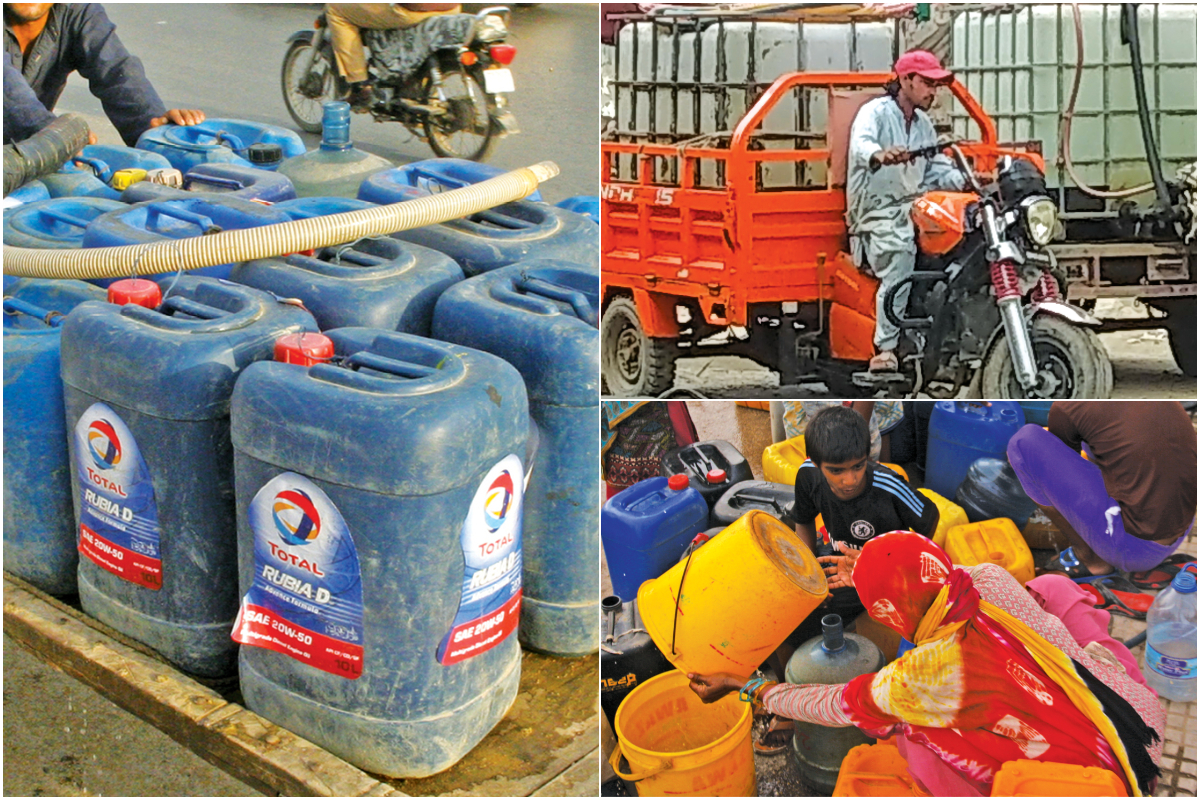
PHOTOS: ATHAR KHAN/BOL NEWS
Poor infrastructure has resulted in the rise of ‘tanker mafia’
Karachi: The increased charges of water tankers, have played havoc with the Karachiites, as they face a severe water shortage, owing to theft, poor infrastructure, and distribution plan.
20 million residents of the megacity, regularly face water shortages. The lower segment of society is the worst hit by a deteriorated distribution and supply system. On the contrary, the tanker mafia is enjoying blooming business, as the urban dwellers are forced to buy water at exorbitant prices.
According to the prices given by various tanker and hydrant owners, on an average, the price of a tanker of 3,000 gallons capacity costs around Rs 8,000. Gul Muhammad, a water tanker owner, said that the price of a 2,000 gallons water tanker at a hydrant in Landhi-Mansehra Colony costs around Rs 5,500.
“A resident can any time get a loaded tanker of 1,000, 2,000 and 3,000 gallons at the Qayyumabad intersection. These tankers bring water from the hydrants situated at Qayyumabad, Rashidiya or the Mansehra Colony Landhi,” he added.
The urban dwellers living in rented apartments are faced with another dilemma, as they cannot order a tanker due to a shared water storage in the building.
Samina Bibi, a resident of Sultanabad area, said that owing to the unavailability of water at her house, she washes dirty clothes and dishes at her mother’s house.
“My husband cannot afford to buy a water tanker. Also, we live in a rented apartment in a building, which has a shared underground tank, and there is acute water storage. We cannot fill it and ask others not to use it,” she added.
“The drilled motor-operated wells known as ‘bores’, are also very expensive, while the groundwater acquired from it, cannot be used for drinking and cooking purposes,” she remarked.

Owing to the government’s neglect, the water infrastructure in the city is very old, while the funds allocated for this purpose, every year are insufficient to fix the problem. Najmi Alam, a leader of Pakistan People’s Party (PPP), said that the infrastructure of the supply line through Hub Canal, carrying water from Hub dam to the city, is also very old, which results in continuous disruption.
“The water theft and the leakages in the main lines result in huge losses. The supply to the city can be increased by around 40 per cent, if we succeed in addressing these problems,” he added.
Karachi gets its water mainly from the Keenjhar Lake, around 150km from the city. Through a network of canals, 550 million gallons of water/day (MGD) is fed into the city’s main pumping station at Dhabeji. However, that water never reaches those who need it.
A staggering 40 per cent, is either lost, due to poor infrastructure or stolen by the water tanker mafia before it reaches the consumers.
The last project to increase the water supply from Keenjhar Lake to Karachi was initiated in 2004 under the leadership of former mayor, Naimatullah Khan. The 100 million gallons/day project was completed in 2006 when Mustafa Kamal was the mayor.
As there is no solution in sight for the water shortage problem, the Karachi Water and Sewerage Board (KW&SB) completed the first phase of the auction of six hydrants, according to a statement issued by the board.
The bill collection of the KW&SB has also been minimal, as the residents in the ‘Katchi Abadis’ across the city are given water connections without any fee or monthly charges. These areas, belonging to Pakistan Railways, Karachi Port Trust (KPT) and other government departments, have been encroached upon on a massive scale, where the land mafia have constructed multistoried buildings.
Likewise, the regularised areas in the metropolis are also confronted with the same issues, as they, even though a little amount, pay the water consumption bills but do not have access to clean water.
The residents of the Cantonment Board Clifton (CBC) are also at the mercy of the water tanker mafia. The authorities are charging a huge amount to provide water connections to the residents, while water in the main pipeline remains scarce most of the time. Muhammad Iqbal, a resident of DHA Phase IV, said that the owner of the house, in which he is living, never bothered to take a water connection, citing the huge fee for getting connection.
“You have to pay the water connection charges even if you have not taken a connection. Resultantly, I have to order tankers from the private vendors, which costs me around Rs 28,000/month. Each tanker of around 3,000 gallons could reach up to Rs 8,000,” he added.
Farhan Anwar, an Urban Planner and Assistant Professor of Practice at Habib University said that there are multiple reasons for water scarcity in the city, one of which is a huge gap between demand and supply. “The city is not getting enough water to fulfill the citizens’ needs. However, we waste around half of the water we get. As per official estimates the water supplied to the city gets converted into non-revenue water, which means that the water either is stolen before reaching consumers, gets wasted due to leakages in supply lines and non-payment of bills,” he added.
The water tariffs are charged on the basis of the area size of houses rather than the usage of water. For example, a house with an area of 100 metres will be charged less than a house of 200 metres, despite the former consuming more water.
“There is no metering of water consumption like the electricity, so the citizens who have access to water do pay attention to the importance of conserving, while the government authorities are also not doing its duty to raise awareness among the masses,” Anwar said. For him, the water theft in the ‘Katchi Abadis’, expanded across the city, is also among the reasons for unaccounted for water, as citizens in those areas take connections illegally, owing to non-availability of proper planning to give them access to water.
“The citizens in these regularised or non-regularised areas are not provided with water. As a result, they take water connection by illegal means which is further worsening the situation,” he said.
There is a need to develop a new vision and proper planning to ensure the availability of water in the city. The authorities can recover and recycle the city’s waste water, a global practice where countries recycle water to make even potable water.
Catch all the Urban Insight News, Breaking News Event and Latest News Updates on The BOL News
Download The BOL News App to get the Daily News Update & Live News.












 Read the complete story text.
Read the complete story text. Listen to audio of the story.
Listen to audio of the story.